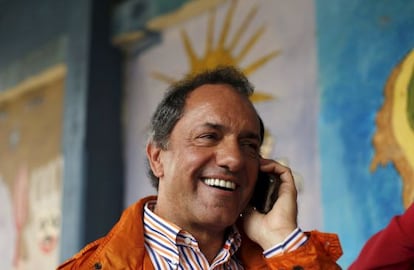Government candidate Daniel Scioli wins Argentinean primaries
Contender for President Fernández de Kirchner's FPV party is favorite in October vote But election too close to call after Buenos Aires mayor finishes seven points behind

Daniel Scioli, the candidate for President Cristina Fernández de Kirchner's center-left Peronist Front for Victory (FPV) coalition, won Sunday’s presidential election primaries held to narrow the field of contenders who will run for Argentinean leader on October 25.
With around 90% of the ballots counted, Scioli, the governor of Buenos Aires province, garnered 38.09% of the vote.
Scioli will likely square off in October with the outgoing conservative mayor of Buenos Aires Mauricio Macri, his main rival, as well as other contenders from different minor parties and coalitions.
More than 32 million Argentineans eligible to vote were obliged by law to cast their ballots on Sunday
The primaries were scheduled so that each party could choose its presidential candidate but voters were free to cross party lines.
Macri, who is a business tycoon and former owner of the Boca Juniors soccer club, has had a number of political confrontations with President Fernández de Kirchner over government policies.
His center-right Cambiemos (Let’s change) coalition captured 30.36% of the vote.
The opposition Peronist faction, with its two rival candidates Sergio Massa and José Manuel de la Sota both seeking the nomination on behalf of the UNA coalition, obtained a combined 20.57%, with Massa winning the nomination.
Scioli was the only contender in the FPV primary while Macri faced several rivals.

The seven-point difference between Scioli and Macri and the large chunk of votes given to UNA indicate that a runoff will most likely take place in November if there is no clear majority winner in October.
President Fernández de Kirchner, who was first elected in 2007, is banned by the Constitution from running for a third consecutive term.
In the past few months, Scioli has tried to distance himself from the president and promised to adjust some of her policies. Despite their differences, the two finally agreed to pool their voting resources and try to stop the business-friendly Macri, whose national popularity has risen in the last several years, at the polls.
Nevertheless, tension still exists between Scioli and Fernández de Kirchner, who believes her possible successor is more center-right than leftist.
While Scioli celebrated his victory with other Kirchnerites in Luna Park, a popular venue for concerts and large events, Macri also seemed satisfied with Sunday’s results. “A new alternative for our beloved Argentina is coming together,” he said.
More than 32 million Argentineans eligible to vote were obliged by law to cast their ballots in the primaries.
Macri’s major objective was to prevent Scioli from obtaining more than 40% while garnering more than 30% for his Cabiemos coalition.
Under the Constitution, a candidate who obtains more than 45% of the vote or earns 40% with a 10% margin over the closest contender will be declared the election victor without the need for a runoff race.
The Kirchnerites have been in power in Argentina since 2003 when Néstor Kirchner was first elected president with the leftist Peronist coalition. In 2007, following his sudden death from a heart attack, his wife Cristina won the presidency in a landslide victory. She won an easy re-election in 2011, but failed to muster enough political support to change the Constitution to allow her to run for a third consecutive term.
Tu suscripción se está usando en otro dispositivo
¿Quieres añadir otro usuario a tu suscripción?
Si continúas leyendo en este dispositivo, no se podrá leer en el otro.
FlechaTu suscripción se está usando en otro dispositivo y solo puedes acceder a EL PAÍS desde un dispositivo a la vez.
Si quieres compartir tu cuenta, cambia tu suscripción a la modalidad Premium, así podrás añadir otro usuario. Cada uno accederá con su propia cuenta de email, lo que os permitirá personalizar vuestra experiencia en EL PAÍS.
¿Tienes una suscripción de empresa? Accede aquí para contratar más cuentas.
En el caso de no saber quién está usando tu cuenta, te recomendamos cambiar tu contraseña aquí.
Si decides continuar compartiendo tu cuenta, este mensaje se mostrará en tu dispositivo y en el de la otra persona que está usando tu cuenta de forma indefinida, afectando a tu experiencia de lectura. Puedes consultar aquí los términos y condiciones de la suscripción digital.








































